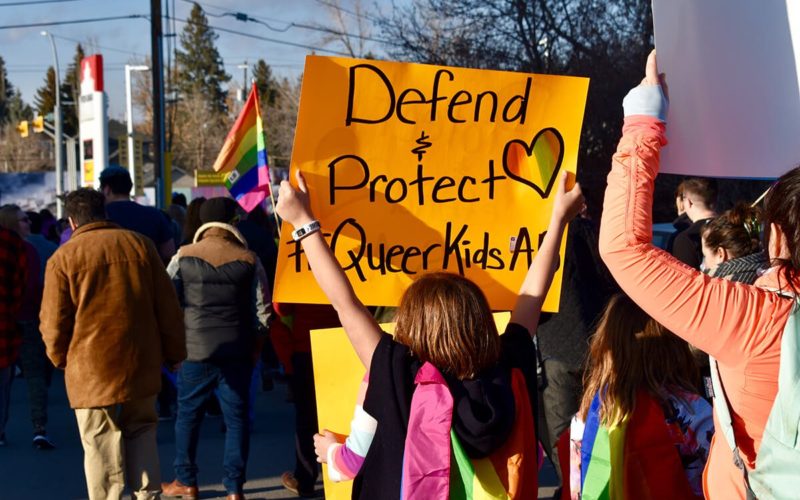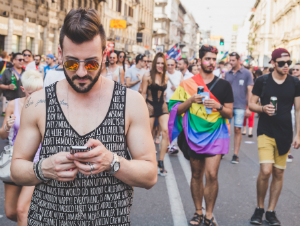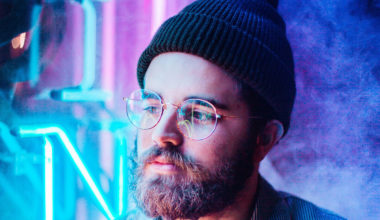A friend of mine once said coming out feels like you are a train. At first, you are riding down a perfectly straight track, and you know the destination: A spouse of a different gender, kids, a job, a house. But something doesn’t feel right, a whisper or a shout that this track isn’t the one for you. Coming out is wrenching yourself off this track — your wheels grating and sparking as you pull them from the metal grid — and setting yourself on a different path. You may be scared or may be told it’s wrong, but eventually — with luck, love, and support from a beautiful community — you can turn this feeling of upheaval into a life.
I was 16 when I set my train on the track called bisexual. It was 2009; the Defense of Marriage Act was still in force. Obama, though newly president, had yet to come out in favor of gay marriage. At my small-town, conservative high school, queer wasn’t a thing you could be, and it certainly wasn’t a compliment. Many of my peers faced outright rejection and harassment from family and friends. All of us faced stigma that was sometimes blatant, sometimes subtle, and always harmful. We got by because we supported each other: a small clutch of queers meeting during lunch in the public school library.
If you’re a young LGBTQ person, know that support isn’t only available: it’s your right. No matter who you are, where you live, or how you identify, you are beautiful and whole. Whenever you need it, help is only a phone call or text message away.
Here are some challenges you as a young LGBTQ person may be experiencing related to mental health and people to call when you just need someone to listen.
Things Are Changing, But LGBTQ Youth Still Face a Stigma
Public acceptance of LGBTQ identity has risen steadily in dozens of countries around the world since 1980. Meanwhile, since 2012, the year marriage equality became law, the percentage of American adults identifying as LGBTQ has risen from 3.5% to 4.5%. Increasing acceptance may be partly to thank for this rise: Today, 79% of Americans support equal legal rights for LGBTQ people, while in 2006, only 51% of Americans said that LGBTQ people should be accepted.
Familial acceptance isn’t a guarantee
This acceptance doesn’t always translate to our experiences in real life, and stigma still stings. A significant portion of Americans, 32%, still say they’d be uncomfortable having a queer family member, 36% would be uncomfortable seeing a queer couple holding hands, and 37% would be uncomfortable with their child having a lesson on LGBTQ history in school. If just learning about our history makes someone uncomfortable, that’s not a very deep kind of acceptance!
LGBTQIA+ affirmative therapy can help.
Looking for a LGBTQIA+ affirmative therapist? Find an experienced therapist
Facing threats of bullying and violence
Meanwhile, LGBTQ youth are more likely to face homelessness, bullying, and interpersonal violence. LGBTQ youth are twice as likely to be bullied than their straight peers, and 18% of LGBTQ youth — more than three times their straight peers — have experienced rape. Women of all sexual orientations face especially high levels of sexual violence and bisexual girls are particularly at risk. Half of those who experience sexual violence are victimized before the age of 17. Partly as a result of family stigma, LGBTQ youth also have a 120% higher risk of homelessness than straight teens.
Increased risk for mental illness
As a result, LGBTQ teens are at a higher risk of mental illness, including depression, anxiety, and substance abuse. Of LGBTQ teens, 30% have attempted suicide, as compared to 10% of their straight peers. Transgender youth face a particularly high level of stigma, and suffer greater mental health risk as a result. Almost half, 49%, of transfeminine people (people assigned male at birth who identify as feminine) and 62% of transmasculine people (people assigned female at birth who identify as masculine) experience depression.
Ways LGBTQ Teens Can Get Help
If you’re an LGBTQ teen, you probably don’t need me to tell you these facts. But it can be helpful to arm ourselves with knowledge for what we’re all facing. It’s not because there is anything wrong with us — we’re perfect just the way we are — it’s society that’s got a problem. While we work on fixing these big social and economic issues, there are resources that you can access to get support now.
For many LGBTQ people, having access to queer-sensitive therapy can be deeply affirming, even life-saving. But, a lot of young people lack a way to get themselves to appointments, don’t have the money to pay for treatment, and may not want friends to know they’re reaching out.
Talkspace now offers services for young adults ages 13-17 via Talkspace for Teens. Once you sign up, you’ll be matched with a licensed therapist who can help provide assistance specifically for the challenges faced by LGBTQ youth.
Here are a few additional resources you can access for free, anytime, for any reason.
The Trevor Project
The Trevor Project (1-866-488-7386): The Trevor Project is one of the first organizations to offer a lifeline specifically for LGBTQ youth and their advocates are there to help. They specialize in young LGBTQ people’s mental health, and they’re available 24/7.They’re a great resource if you need help or just want to talk about your life.
LGBT National Youth Talkline
LGBT National Youth Talkline (1-800-246-7743): The Talkline is open daily, with trained peer counselors ready to talk about mental health, dating, coming out, sexual health, or anything you need. They also maintain an LGBT youth resource center, where you can connect to support in your area. This talkline is not open 24/7, so if you need immediate help, it’s a good idea to connect to one of the other resources.
National Suicide Prevention Lifeline
National Suicide Prevention Lifeline (1-800-273-8255): The Lifeline is a free, anonymous, 24/7 helpline and chat service for anyone struggling with issues related to suicide. The Lifeline has counselors specifically trained to be sensitive to LGBTQ issues. If you have suicidal thoughts, know someone at risk, or just want to talk about the issue, reach out. This resource is for you.
National Alliance on Mental Illness Helpline
National Alliance on Mental Illness Helpline (800-950-NAMI): NAMI offers a daily hotline that you can call to talk about mental health and to find resources in your area. The hotline is only open weekdays, so if you have a more immediate need, it’s a good idea to reach out to a 24/7 resources like The Trevor Project.
Love is Respect
Love is Respect (1-866-331-9474): LGBTQ teens experience dating violence, too, and it’s never alright. Many young LGBTQ people aren’t out to their families or communities, and many anti-violence organizations lack expertise in helping LGBTQ people. Because of these circumstances it can be even harder to get help. Love is Respect has resources for LGBTQ young people to learn about healthy relationships and their counselors are available 24/7 to offer education, support, or to talk through your options.
Rape, Abuse, and Incest National Network
Rape, Abuse, and Incest National Network (800-656-4673): LGBTQ youth are at an especially high risk of sexual violence. Sexual violence is a difficult experience for any survivor, but it can be especially hard for young LGBTQ people who may not have support. Remember, your consent always matters, and anyone who violates your consent — whatever their gender or sexual orientation — is in the wrong. If you’ve experienced sexual violence, or you simply want to talk, you can call RAINN’s hotline anytime.
National Runaway Safeline
National Runaway Safeline (1-800-RUNAWAY): The Safeline is available for all youth who feel unsafe at home, are considering running away from home, or have run away. You can call or message 24/7 if you’re being bullied, abused, need help finding shelter support, or just need to talk.
Traveling Bravely Toward a Better Life
Being LGBTQ can be hard! It’s scary to realize that your life path may be different than those around you and face stigma for the bravery of living the way you need and want. While we’ve come far, we still have a long way to go before LGBTQ people can live lives of equal dignity, safety, and material security.
But your LGBTQ identity is also a great strength. It can help you see the world in a different and special way, and can allow you to love amazing people. It makes you a member of a beautiful, welcoming community of people from across the world and across history who have dared to live according to their truth. Remember, whether it’s your high school friends eating lunch together in the library, or any of the organizations listed in this article, you’re never, ever alone.
Talkspace articles are written by experienced mental health-wellness contributors; they are grounded in scientific research and evidence-based practices. Articles are extensively reviewed by our team of clinical experts (therapists and psychiatrists of various specialties) to ensure content is accurate and on par with current industry standards.
Our goal at Talkspace is to provide the most up-to-date, valuable, and objective information on mental health-related topics in order to help readers make informed decisions.
Articles contain trusted third-party sources that are either directly linked to in the text or listed at the bottom to take readers directly to the source.




